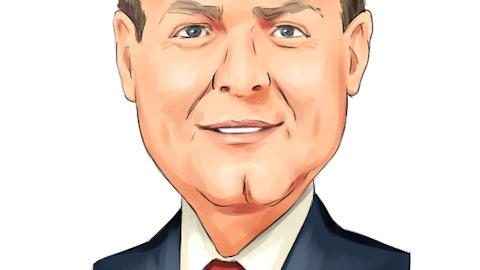Kevin Fitzsimmons: Okay. Great. That’s helpful. And then just a follow-up on the margin. I totally understand that, Nicole, you’re not wanting to declare victory on calling a trough but if we, say we’re getting close to that maybe, we have some, moderating pace of compression, maybe, call it the next quarter or two. As we look into ’24, do we hit a point in early ’24 in your view, where the fixed asset repricing should start to outpace the rising deposit costs? And I know a lot of that hinges on does that noninterest-bearing shift really slow down and come to a halt. But assuming that slowing also, do we anticipate kind of modest margin compression maybe starting in the second quarter through ’24?
Nicole Stokes: So I would guide that there is some stabilization, absolutely. And I think you said, there is some mild compression after the second quarter. And I’m not necessarily saying that there’s more compression coming, but there may not be a lot of expansion coming. So I think it stabilizes and kind of in that higher for longer mentality it stabilizes and then again a lot of that has to do with competitors and if there are some sort of liquidity issue, that all of a sudden starts driving — not liquidity issue with us, but the liquidity issue in the market or with other competitors that causes, people to start paying off for those deposits, it could — we could certainly see the trickle effect. But from a repricing standpoint, we’ve got 36% of our loans that repriced within the next 12 months.
And so there is definitely some upward movement on the asset side that should help, I just been very hesitant because of what we’re seeing on the deposit side and some erratic competition.
Kevin Fitzsimmons: Okay. But it sounds like you’re saying that’s really going to serve to help keep it stable, not necessarily outpace it over the course of ’24. Is that fair?
Nicole Stokes: Yes. That is fair and that is absolutely the goal and the target.
Kevin Fitzsimmons: Okay. Great. And just — Palmer, just throwing one out there. I know there hasn’t been a lot of M&A activity, and obviously, you guys are not in this situation that a lot of banks are in terms of having the bond portfolios quite underwater and that slowing down activity. But how — what’s your view on that in terms of, the pace of conversations, your interest, your appetite, [Technical Difficulty] anything happening over the next year or two?
Palmer Proctor: Yeah. I think over the next year or two, you’re going to see, a wave of consolidation. We’ve got a couple of deals announced just recently as in the industry and I think you’ll continue to see that accelerate. When you look at, you look at the industry going forward, I do think, I don’t even like to say higher for longer, I just think rates will stay where they are because they really aren’t that high right now relative to historical measures. And I think we all just need to kind of adapt and adjust to that. But what that means is that a lot of banks are going to remain under pressure for the earnings. They don’t have the core deposit base, so they don’t have the diversification in their asset generation and so it’s going to create hardships.
So, I think they’re going to be more and more people looking to partner together. And so as we see that and assuming they can get regulatory approval, which right now is a big timing issue and a big if all the way around. I think, aside from that, there should be a lot of activity taking place over the next, as we look out into next year and into the following year.
Kevin Fitzsimmons: Great. Thanks very much.
Operator: Our next question comes from Russell Gunther from Stephens. Please go ahead with your question.





